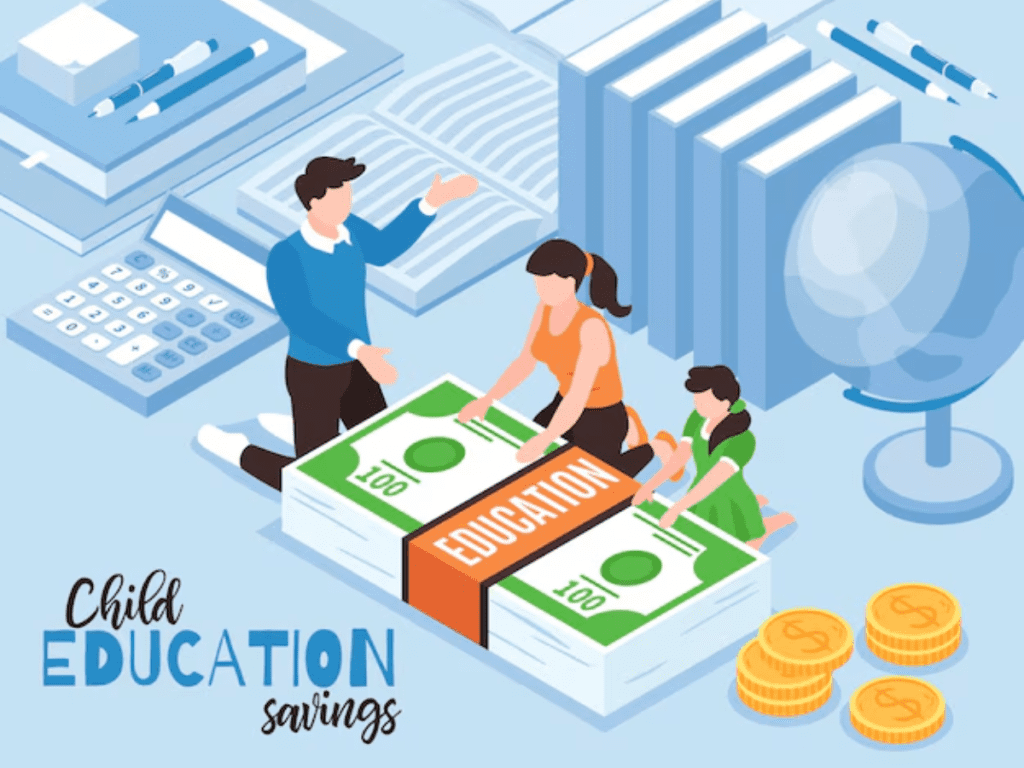Introduction
Higher studies are an expensive affair, and for several students, it is the sole option to study with the help of an education loan. While loans finance the education, it may become suffocating to repay them at the start of one’s working life. The monthly installments and piling interest can result in financial distress if not addressed correctly.
But with clever planning and responsible spending habits, you can settle your education loan earlier without overloading your finances. This is a complete guide that will offer practical tips to enable you to settle your education loan early and be financially stable at the same time.
Understanding Your Education Loan
Before you begin repayment of your loan, you should know its structure and terms. This will enable you to make good decisions regarding payment strategies.
Salient Features of an Education Loan
- Loan Amount – The amount lent by a bank or financial institution.
- Interest Rate – The rate paid on the borrowed amount, either fixed or floating.
- Repayment Tenure – The overall time within which the loan is to be repaid.
- EMI or Equated Monthly Installment – The monthly fixed installment paid towards loan repayment.
- Moratorium Period – The time period within which the borrower does not need to repay the amount, usually six to twelve months after completing the course.
- Processing Fees and Other Charges – Other charges that are involved in loan disbursement and repayment.
Knowing these factors will enable you to plan a systematic repayment strategy that reduces financial stress.
Start Repayment During the Moratorium Period
Most education loans have a moratorium period where you do not need to pay anything. But the interest is still added to the outstanding amount. It can build up the total amount you need to repay very fast if not handled well.
Rather than waiting for the moratorium period to end, make part payments towards the interest or even half EMIs. This is beneficial in several ways:
- Decreases the total loan burden by reducing the amount of accumulated interest.
- Facilitates developing financial discipline in the early stages.
- A few lenders grant interest rate waivers if payments are made during the moratorium period.
Even if you are unable to pay the full EMIs, paying whatever little you can will benefit you in the long term.
Selecting the Proper Repayment Plan
Most lenders provide various repayment plans, which enable the borrowers to select the most appropriate plan according to their financial condition.
Standard Repayment Plan
It requires fixed EMIs to be paid over the loan period. It is ideal for borrowers who enjoy a steady income and can pay regular installments.
Graduated Repayment Plan
As per this plan, the EMI is lower in the beginning and goes up over a period of time. This is suitable for individuals who anticipate a rise in their income in the near future.
Income-Based Repayment Plan
In this plan, borrowers are allowed to repay EMIs as per their income. If your income is low, the EMI will also be less, easing the financial burden.
Selecting the appropriate repayment option is important to avoid putting yourself into undue financial stress while returning your loan.
Pay More Than the Minimum EMI Whenever Possible
Pay only the minimum EMI to lengthen the repayment term and pay more interest overall. If you can manage it, make some extra payments on your loan. Even small extra payments will have a dramatic effect on cutting the overall loan burden.
- If your EMI is a fixed amount, round it up to the next higher figure.
- Whenever you get a bonus, tax refund, or any other surprise income, invest a part of it in making lump sum payments towards your loan.
- If you make one extra EMI annually, you can reduce the tenure and save on interest charges.
The sooner you pay off the principal amount, the lower the interest you will have to pay in the long term.
Increase Your EMI Amount When You Receive a Salary Hike
As your salary increases, it is best to raise your EMI payments proportionally. Most banks and financial institutions permit borrowers to raise their EMI amounts without any charges.
For instance, if you get a rise in salary by a percentage point, you can use a portion of that raise to pay your loan. You will be paying off your loan much earlier and saving a lot on interest.
Rather than using extra earnings on discretionary expenses, paying debt first will benefit your finances.
Think About Refinancing or Balance Transfer
If you discover a lender with a lower interest rate than your existing loan, you can refinance or roll over the loan to another lender.
Advantages of Loan Refinancing
- Lower interest rates save you money in the long run.
- Refinancing can provide more favorable repayment terms that fit your budget.
- If your credit score has increased since you took the loan, you might be eligible for improved loan terms.
Compare processing charges and prepayment charges before choosing loan refinancing to make sure the benefits are more than the expenses.
Make the Most of Tax Benefits on Education Loans
Education loans have the advantage of tax relief that may reduce your economic burden. Interest on education loans is tax deductible under Section 80E of the Income Tax Act.
- There is no cap on the quantum that may be claimed as a deduction.
- The benefit can be claimed for a maximum of eight years from the repayment year of inception.
- Either the student or the parent can claim this deduction, depending on who is paying back the loan.
Using tax benefits, you can essentially reduce the expense of your loan and invest the savings in additional payments towards repayment of the loan.
Embrace Smart Budgeting to Manage Loan Payments
An organized budget enables effective control over expenses while making timely repayment of loans.
Budgeting Hints for Loan Payment
- Monitor your income and expenses to determine the areas where you can save.
- Dedicate a specific amount of your earnings towards repayment of your loan.
- Create an emergency fund for covering sudden expenses so that your loan repayment is steady.
Utilizing budgeting software or spreadsheets will aid in keeping your financial well-being in check and make sure loan repayment is at the forefront.
Find Additional Income Streams to Expedite Repayment
Growing your income from extra sources will also greatly hasten loan repayment. Some sources of extra income include:
- Getting freelance jobs like writing, designing, or tutoring.
- Working part-time on weekends.
- Selling online products or providing online courses.
Any extra income generated must be utilized to make additional payments towards your education loan, thus lessening the overall burden.
Do Not Take Up More Debt Until Your Loan is Paid Off
While paying back an education loan, one must not take up unnecessary financial burdens.
- Shun credit card debt, as it has very high interest charges.
- Delay big-ticket purchases that involve borrowing personal loans.
- Prioritize paying off your current loan before taking new financial commitments.
By not taking extra debt, you can concentrate on paying back your education loan soon and being in a financially healthy state.
Automate EMI Payments to Avoid Late Fees
Missing loan payments can result in penalties and negatively impact your credit score. Setting up automated EMI payments ensures that your repayments are made on time.
Many banks offer the option to automate loan repayments through standing instructions, ensuring that you never miss a due date. This also helps in maintaining a good credit score, which is beneficial for future financial requirements.
Establishing a Sound Financial Base While Paying Off Your Education Loan
While paying off your education loan is a priority, it is also important to establish a sound financial base for the future. Borrowers often err by concentrating on loan repayment alone and ignoring other areas of financial planning. Finding a balance between loan repayment and financial security will guarantee long-term stability.
1. Build an Emergency Fund
Anytime expenses come up unexpectedly, and without having a cushion in place, you might find yourself unable to maintain loan repayments. Building an emergency fund ensures that you can avoid financial hardship and never miss EMIs.
- Save for three to six months of living costs.
- Keep the fund in a liquid savings account for easy access when required.
- Save a small fraction of your monthly income into this fund and keep making loan repayments.
It is ensuring that you do not go into more debt in case of any unexpected expense, like medical charges or abrupt job loss.
2. Begin Saving for Other Financial Milestones
While paying back your education loan, do not forget other financial milestones. If you are likely to purchase a house, invest in a company, or retire, begin saving small amounts for these milestones.
- Create a separate savings account for long-term financial milestones.
- Invest in fixed deposits, mutual funds, or government savings schemes to increase your savings over time.
- If your employer offers retirement benefits, contribute part of your salary to accumulate long-term wealth.
Equating loan repayment with savings ensures that you are not left financially exposed after your debt is paid off.
3. Enhance Your Credit Score While Repaying the Loan
Your credit score is important in deciding your future financial prospects. A good credit score can get you a better interest rate on home loans, car loans, or even personal loans in the future.
To establish and maintain a good credit score:
- Always pay your EMIs on time without missing deadlines.
- Be careful not to use credit cards or personal loans extensively while paying for your education loan.
- As much as is possible, prepay part of your loan so as to lower your debt-to-income ratio.
Conclusion
Paying back an education loan need not be stressful if you strategize. If you know your loan arrangement, make additional payments, select an appropriate repayment scheme, and judiciously manage expenditures, you can repay your loan early without being financially strained.
With responsible money discipline and intelligent budgeting, you can repay your education loan economically and gain economic independence.

